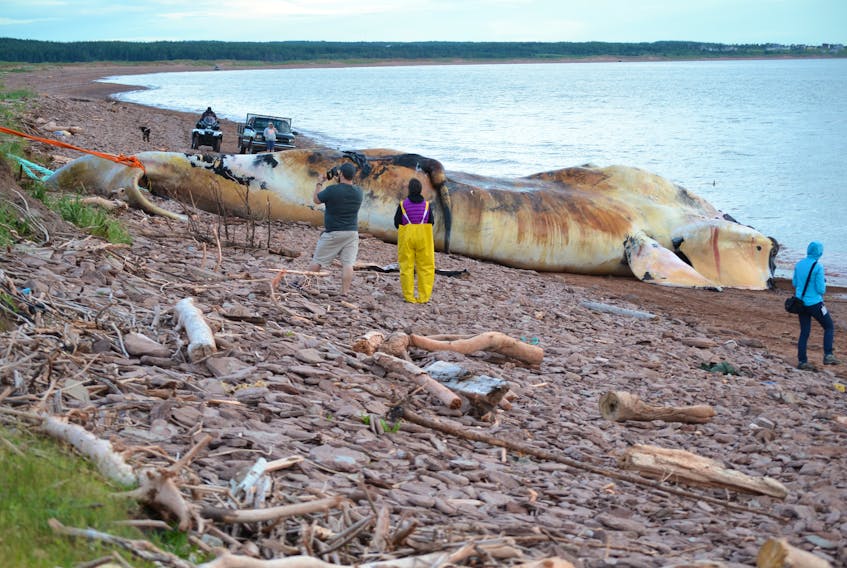The North Atlantic right whale population lost another member Thursday.
On June 20, just hours after the International Fund for Animal Welfare (IFAW) released a report on North Atlantic right whale mortalities, the Fisheries and Oceans Canada confirmed the death of a second whale in Canadian waters this year.
The IFAW report comes in response to a retrospective review of 70 right whale deaths in Canadian and U.S. waters between 2003 and 2018. The study calls on Canada and the United States to enact stricter measures to protect the endangered whale species.
There were no deaths reported in Canada last year, but the IFAW report notes an unprecedented 17 mortalities in 2017, including 12 in Canadian waters.
The report indicates that in the 43 deaths in which cause of death was determined, natural causes was not identified in any of them. Human factors were identified in over 88 per cent of those cases including entanglement in fishing gear and vessel strikes being the cause of 22 and 16 deaths, respectively.
“This is clear evidence that these animals are unable to live full, productive lives because they are dying prematurely as the result of human activities,” said Sarah Sharp, a veterinarian with the IFAW and a key contributor to the study.
Thursday’s report said the whale population had shrunk to an estimated 411 animals worldwide, but that was before the latest loss.
During a Transport Canada aerial surveillance flight, Fisheries and Oceans Canada received a report of a dead North Atlantic right whale drifting in the Gulf of St. Lawrence northeast of the Magdalen Islands.
Fishery officers located the whale and installed a satellite tag to track it while the department assesses recovery and necropsy options.
A June 7 necropsy on a right whale discovered off Quebec’s Gaspe coast on June 4, “did not reveal evidence of acute (recent) fishing gear entanglement or recent vessel strike,” Fisheries and Oceans Canada said. Further testing to investigate other possible causes of death is pending. That whale was discovered in an area previously closed to fishing activity as part of the 2019 management efforts.
Sharp is not ready to rule out human activity as a key factor in the death of the whale known as Wolverine discovered June 4. She noted he had survived multiple entanglements and a vessel strike.
“We know that he has been under pressure from these human threats previously,” said Sharp. "With a population this small and declining birth rates, the loss of even one individual represents a major blow to the recovery of the species as a whole... The data tell a very compelling story, one which we need to turn around now to bring the species back from the brink of extinction."
IFAW key recommendations to improve North Atlantic right whale populations:
- employing more effective gear modifications, including ropeless fishing
- expanding vessel speed restrictions to include larger swaths of North Atlantic right whale habitat
- implementing dynamic management strategies, including fisheries closures and vessel speed restrictions when right whales are present
- coordinated marking of gear for better monitoring of where entanglements occur
- expanding the survey of offshore habitats for North Atlantic right whale carcasses for more accurate mortality statistics and cause of death
"Unfortunately, the whales really don’t have a lot of time,” Sharp said. “We need to do this as soon as possible.”
“The Government of Canada is committed to protecting North Atlantic right whales and supports the International Fund for Animal Welfare’s call for action,” said Fisheries and Oceans Canada by email to a request for reaction to the IFAW report.
With confirmed right whale sightings in Canadian waters this season, Fisheries and Oceans Canada has already implemented a number of closures for snow crab, lobster and all other non-tended fixed gear fisheries since April 28 Atlantic Canada.
It added that robust fisheries management measures and mandatory speed restrictions take into account the best available science and input from stakeholders, partners, experts, and Indigenous peoples.
Sharp explained ropeless fishing technology.
“It’s fishing without a buoy on the surface,” she said. “It’s a much more advanced technology than what’s currently being employed, but the main point of it is to reduce the amount of vertical line in whale habitat in order to, again, reduce the risk of entanglement in that gear.”
Tonya Wimmer, director of the Marine Animal Response Society based in Nova Scotia, acknowledged the need for special consideration for the endangered species.
“If we are going to engage in a fundamental effort to save this species, it is critical that organizations continue collaborating to understand exactly what the drivers of such events are in order to avoid future right whale mortalities," said Wimmer in the IFAW report.
Sharp said she is hoping the realization that so many of the endangered whales are dying at the hands of humans will spur people to action.
“I’m hoping people are really starting to look for answers, and that’s what we need. We really need to change the political will to institute these changes that are going to be a bit more severe and more directed in their approach,” she said.
Canada's federal election this fall is an opportunity for Canadians to ask candidates how they will support the right whales.
“That new government can potentially decide the fate of these whales,” said Sharp.
RELATED:









